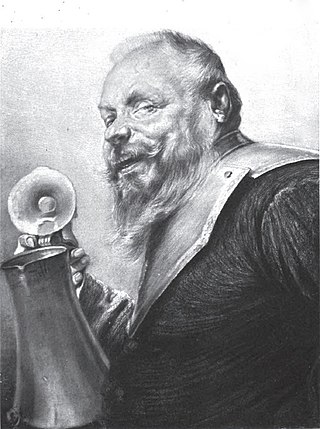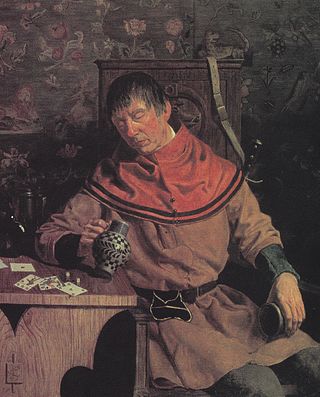
Barnard "Barney" Gumble is a recurring character in the American animated TV series The Simpsons. He is voiced by Dan Castellaneta and first appeared in the series premiere episode "Simpsons Roasting on an Open Fire".

A sidekick is a slang expression for a close companion or colleague who is, or is generally regarded as, subordinate to those whom they accompany.

William Kempe, commonly referred to as Will Kemp, was an English actor and dancer who specialised in comic roles. He was best known as one of the original stage actors in early dramas by William Shakespeare, and roles associated with his name may have included the comic creation Falstaff. His contemporaries considered him to be a successor to the great clown of the previous generation, Richard Tarlton.

A villain is a stock character, whether based on a historical narrative or one of literary fiction. Random House Unabridged Dictionary defines such a character as "a cruelly malicious person who is involved in or devoted to wickedness or crime; scoundrel; or a character in a play, novel, or the like, who constitutes an important evil agency in the plot". The antonym of a villain is a hero.

Robert Armin was an English actor, and member of the Lord Chamberlain's Men. He became the leading comedy actor with the troupe associated with William Shakespeare following the departure of Will Kempe around 1600. Also a popular comic author, he wrote a comedy, The History of the Two Maids of More-clacke, as well as Foole upon Foole, A Nest of Ninnies (1608) and The Italian Taylor and his Boy.

Fop became a pejorative term for a man excessively concerned with his appearance and clothes in 17th-century England. Some of the many similar alternative terms are: coxcomb, fribble, popinjay, dandy, fashion-monger, and ninny. Macaroni was another term of the 18th century more specifically concerned with fashion.
Comic relief is the inclusion of a humorous character, scene, or witty dialogue in an otherwise serious or dramatic work, often to relieve tension.

Drunken Master, also known as Drunken Master The Beginning, is a 1978 Hong Kong martial arts comedy film directed by Yuen Woo-ping and produced and co-written by Ng See-yuen. The film features much of the same crew as Yuen's Snake in the Eagle's Shadow released earlier the same year, including lead actors Jackie Chan, Yuen Siu-tien, and Hwang Jang-lee; although narratively unrelated, Drunken Master bears similarities to its predecessor in its story and style.

Foster Brooks was an American actor and comedian best known for his portrayal of a lovable drunk in nightclub performances and television programs.
"Days of Wine and D'oh'ses" is the eighteenth episode of the eleventh season of the American animated television series The Simpsons. It originally aired on the Fox network in the United States on April 9, 2000. In the episode, Barney realizes how much of a pathetic drunk he is after watching his birthday party video and decides to give up alcohol forever, which upsets his friend Homer. Meanwhile, Bart and Lisa work together to take a memorable photo for a new phone book cover contest.
Dry drunk is an expression coined by the founder of Alcoholics Anonymous that describes an alcoholic who no longer drinks but otherwise maintains the same behavior patterns of an alcoholic.

Jan Onufry Zagłoba is a fictional character in the Trilogy by Henryk Sienkiewicz. Together with other characters of The Trilogy, Zagłoba engages in various adventures, fighting for the Polish–Lithuanian Commonwealth, and seeking adventures and glory. Zagłoba is seen as one of Sienkiewicz most popular and significant characters. While he has often been compared to Shakespearean character of Falstaff, he also goes through extensive character development, becoming a jovial and cunning hero.

The wise fool, or thewisdom of the fool, is a form of literary paradox in which, through a narrative, a character recognized as a fool comes to be seen as a bearer of wisdom. A recognizable trope found in stories and artworks from antiquity to the twenty-first century, the wisdom of the fool often captures what Intellectualism fails to illuminate of a thing's meaning or significance; thus, the wise fool is often associated with the wisdom found through blind faith, reckless desire, hopeless romance, and wild abandon, but also tradition without understanding, and folk wisdom.

Otis Campbell is the fictional "town drunk" in Mayberry on the American TV sitcom The Andy Griffith Show. Otis was played by Hal Smith and made frequent appearances on the show from 1960 to 1967 but stopped appearing toward the end of the series because of concerns raised by the sponsors over the portrayal of excessive drinking.

Touchstone is a fictional character in Shakespeare's play As You Like It. He is a court Jester, he was used throughout the play to both provide comic relief through sometimes vulgar humor and contrarily share wisdom, fitting the archetype of the Shakespearean fool. Oftentimes, he acts as a character who foils his surroundings, observing and mocking the events and characters of the play.

Fluellen is a fictional character in the play Henry V by William Shakespeare. Fluellen is a Welsh Captain, a leader of a contingent of troops in the small army of King Henry V of England while on campaign in France during the Hundred Years' War. He is a comic figure, whose characterisation draws on stereotypes of the Welsh at that time, but he is also portrayed as a loyal, brave and dedicated soldier.

Stage Irish, also known as Drunk Irish, or collectively as Paddywhackery, is a stereotyped portrayal of Irish people once common in plays. It is an exaggerated or caricatured portrayal of supposed Irish characteristics in speech and behaviour. The stage Irishman was generally "garrulous, boastful, unreliable, hard-drinking, belligerent and chronically impecunious". This caricature includes many cultural outlets, including the stage, cartoons published in Punch and English language clichés, including terms such as "Paddywagon" and "hooligan".

Christopher Sly is a minor character in William Shakespeare's The Taming of the Shrew. He is a drunk man who is easily dominated by women, set up as a foil to Petruchio, the central male character in the play.

Bardolph is a fictional character who appears in four plays by William Shakespeare. He is a thief who forms part of the entourage of Sir John Falstaff. His grossly inflamed nose and constantly flushed, carbuncle-covered face is a repeated subject for Falstaff's and Prince Hal's comic insults and word-play. Though his role in each play is minor, he often adds comic relief, and helps illustrate the personality change in Henry from Prince to King.
















